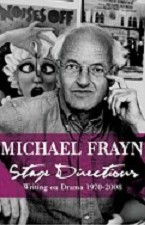| On Paradox, Play-making and Political Theatre |
Theatre Writer Book |
| Michael Frayn , Faber & Faber , October 18, 2008 |
 Curtain Call in Aberystwyth this past spring pulled a smart trick on an old favourite. “Noises Off” requires that the set be reversed between acts. Director Timothy Howe left the set as it was and reversed his audience. Michael Frayn, the most philosophical of playwrights, would have been delighted.
Curtain Call in Aberystwyth this past spring pulled a smart trick on an old favourite. “Noises Off” requires that the set be reversed between acts. Director Timothy Howe left the set as it was and reversed his audience. Michael Frayn, the most philosophical of playwrights, would have been delighted. Philosophy and jokery are not so far removed. “Alphabetical Order”, in the author's view, is about the interdependence of order and disorder. Similarly “the actors in “Noises Off” have fixed the world by learning roles and rehearsing their responses. The fear that haunts them is that the unlearned and the unrehearsed...will seep back onto the stage.” Plays belong to their author but their performance belongs, if that is the right term, to their audience. Nonetheless, Frayn's own views illuminate. On “Copenhagen” for instance: “the epistemology of intention is what the play is about.” “Democracy”: “complexity is what the play is about.” Frayn likes complexity. Since complexity- a very different thing from complicatedness- is the basis of good art-making, his prominence in theatre and the novel, a rare combination, is no surprise. He likes paradox too and traces it up to the nature of the universe itself. The universe “has vastness only in relation to ourselves and the things around us, has structure only in so far as we give it expression in our perception and language, has objective form only in so far as we conceive it from our single standpoint in space and time.” It is the theme that is central in his big, and good ,“the Human Touch.” In summary he writes: “So far as I can see, all of these plays are attempts to show something about the world...not to promote any particular idea of it.” In fact it is about the opposite. “What they are all about in one way or another (it seems to me) is the way in which we impose our ideas upon the world upon us.” The subtitle for “Stage Directions” is “Writing on Theatre 1970-2008”. It covers 262 pages, not a mountain for almost 40 years. Michael Frayn is no David Edgar. This is not intended as impoliteness to Edgar whose offstage writings are essential. “Testing the Echo” is one of the best of the year to date. But dichotomies are always roughly hewn. “Political” is thrown around slackly in both praise and condemnation in theatre argument. Edgar's “the Shape of the Table” is one of the best ever of politics in action. So too is Frayn's “Democracy.” That play has a thirty-three page essay in this collection. Frayn describes the background and the achievement of Willi Brandt but also homes into the man. His political associates made complaint of “his indecisiveness, his avoidance of confrontation, his uncommunicativeness, his proneness to depression, and his vanity. He made many conquests, but had few real friends. He extended a personal intimacy to a hall full of people but not to many individuals taken on their own.” There is the paradox in politics and also its theatricality. History is also unknowable in its last degree. The essay on “Copenhagen” covers an exhaustive forty pages. Within it Frayn illustrates the slipperiness of historical verdict. He cites Samuel Goudsmit who wrote at the time of Heisenberg's death in 1976. “He was a very great physicist, a deep thinker, a fine human being, and also a courageous person. He was one of the greatest physicists of our time but he suffered severely under the unwarranted attacks by fanatical colleagues. In some respects he must be considered a victim of the Nazi regime.” Against which Frayn cites Robert Jungk from 1956 on the paradox. “Under a dictatorship active resistance can only be practised by those who pretend to collaborate with the regime. Anyone speaking out openly against the system thereby indubitably deprives himself of any chance of active resistance.” There is the nub of why Born and Heisenberg lend themselves to dramatic treatment. |
Reviewed by: Adam Somerset |
This review has been read 1406 times There are 34 other reviews of productions with this title in our database:
|
